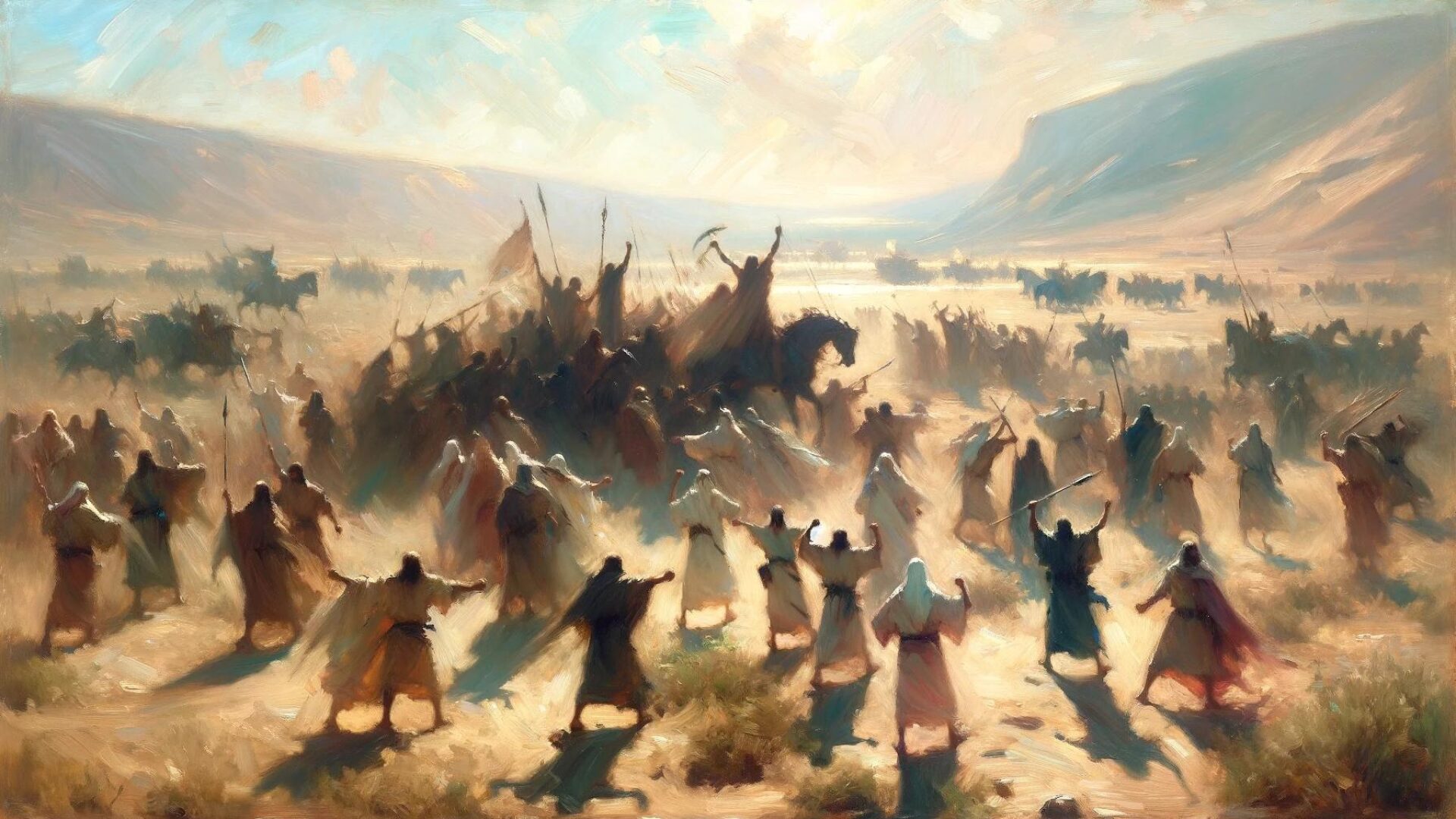1 Kings Summary
The book of 1 Kings, an integral part of the Hebrew Bible and the Old Testament, provides a detailed account of the history of Israel from the final days of King David to the reign of King Ahab.
This narrative not only delves into the succession of Solomon to the throne but also examines the complexities of his reign, including the construction of the Temple in Jerusalem.
The book offers insights into the political, religious, and social dynamics of ancient Israel, highlighting the tensions between prophetic voices and royal authority. It also explores themes of leadership, faith, and the consequences of obedience and disobedience to God.
What is the lesson learned from the book of 1 Kings?
What is the lesson learned from the book of 1 Kings? In 1 Kings, we learn that leadership deeply impacts a nation’s fate, with faithfulness to God bringing prosperity and idolatry leading to downfall, emphasizing the crucial balance between moral integrity and the exercise of power.
The Main Events of 1 Kings
- Solomon’s Grand Beginning: At the onset of his reign, Solomon masterfully orchestrates the construction of the Temple and his royal palace, setting a tone of splendor and devotion.
- A Nation Splits in Two: Following Solomon’s rule, Israel’s unity crumbles, giving rise to two distinct realms: Israel in the north, rich with history, and Judah in the south, steadfast in tradition.
- Jeroboam’s Misguided Leadership: In Israel, Jeroboam, the ambitious king, veers off the path of faith, enticing his people into the shadows of idolatry with his golden calves.
- Ahab and Elijah’s Epic Struggle: King Ahab’s notorious reign in Israel sparks a fierce confrontation with Elijah, the fearless prophet, in a battle of morals and divine power.
- Elijah’s Courageous Crusade: As a lone prophet, Elijah rises against the tide of idol worship in Israel, championing faith with unwavering determination.
- A Spectrum of Kings: The divided kingdoms of Israel and Judah witness a diverse array of rulers – from the righteous Jehoshaphat to others steeped in wickedness, each shaping their realm’s destiny.
- Israel’s Downfall: Israel’s persistent sinfulness culminates in a devastating judgement, marking an end fraught with loss and reflection.
- Judah’s Trials and Exile: Amidst external threats and internal turmoil, Judah faces the onslaught of Babylonian forces, leading to a poignant period of exile and introspection, setting the stage for the continuing narrative in 2 Kings.
Chapters 1-2, Transition of Power from David to Solomon
Chapters 1 and 2 of 1 Kings focus on the dramatic transition of power from King David to his son Solomon.
As David’s health declines, Adonijah, his son, attempts to claim the throne, but Nathan the prophet and Bathsheba, Solomon’s mother, intervene. They remind David of his promise to make Solomon king, where David swiftly acts, declaring Solomon as his successor.
Solomon is anointed and officially proclaimed king, leading Adonijah to fear for his life. However, Solomon shows mercy, promising safety as long as Adonijah remains loyal.

David’s final instructions to Solomon, found in Chapter 2, blend wisdom with directives for dealing with certain individuals. He urges Solomon to follow God’s ways and commands, ensuring the prosperity of his reign. But David also lists adversaries, like Joab and Shimei, advising Solomon to deal with them wisely.
After David’s death, Solomon’s reign begins with decisive actions to establish his authority.
He confronts Adonijah, who had requested to marry Abishag, a former companion of David, viewing this as a threat to the throne and ordering Adonijah’s execution. Joab, realizing his precarious position, seeks asylum in the Tent of the Lord but is also executed on Solomon’s orders. Solomon spares Shimei initially but later orders his execution for violating the terms of his house arrest.
These chapters set a complex tone for Solomon’s reign, marked by both wisdom and ruthless political maneuvering, ensuring the stability and continuity of his kingdom.
Chapters 3-4, Establishment of Solomon’s Wisdom and Kingdom
Chapters 3 and 4 of 1 Kings vividly depict the establishment of Solomon’s wisdom and the expansion of his kingdom.
The narrative begins with Solomon’s divine encounter in a dream at Gibeon, where God offers him anything he desires. In a display of humility and foresight, Solomon asks for wisdom to govern his people justly. Impressed by this request, God grants him not only unparalleled wisdom but also wealth and honor beyond any other king of his time.
The depth of Solomon’s wisdom is soon tested in the famous case of two women claiming to be the mother of the same baby. Solomon’s ingenious solution – proposing to divide the baby in two – reveals the true mother through her compassionate response. This episode cements Solomon’s reputation for wisdom across the entire nation.

In Chapter 4, the focus shifts to the administration of Solomon’s kingdom. It details the organization of his court, including officials, priests, and twelve district governors who oversee various regions, ensuring the kingdom’s efficient management.
The chapter also highlights the prosperity and peace of Solomon’s reign, noting the abundance of daily provisions for his household and the extent of his dominion, which spans from Tiphsah to Gaza.
Additionally, it mentions Solomon’s intellectual pursuits, stating that he speaks 3,000 proverbs and composes 1,005 songs, and his wisdom surpasses all the wisdom of the East and all the wisdom of Egypt.
These chapters encapsulate Solomon’s rise not only as a wise ruler but also as a powerful monarch, overseeing a period of unparalleled peace and prosperity in Israel’s history.
Chapters 5-8, Construction and Dedication of the Temple
Chapters 5 to 8 of 1 Kings detail the pivotal event of Solomon’s reign: the construction and dedication of the Temple in Jerusalem. This grand project begins in Chapter 5, where Solomon makes a treaty with Hiram, king of Tyre, securing valuable cedar and cypress wood from Lebanon, alongside skilled craftsmen.
The chapter sets the stage for a monumental undertaking, highlighting the extensive preparations and resources gathered for building the Temple.
Moving into Chapter 6, the narrative dives into the construction phase, providing detailed descriptions of the Temple’s dimensions, intricate designs, and the lavish materials used, including gold and fine stones, emphasizing the careful attention to detail and the devotion poured into every aspect of the structure.

This chapter also notes that the entire construction process takes seven years to complete.
Chapter 7 shifts focus slightly, describing the construction of Solomon’s own palace and other related buildings, which takes an impressive thirteen years. And also details the craftsmanship of Hiram of Tyre, who fashions various bronze items for the Temple, such as the pillars Jachin and Boaz, the Sea of cast metal, and various basins, all rich in symbolism and artistry.
The climax of this narrative is found in Chapter 8, where Solomon orchestrates a grand, solemn ceremony to dedicate the Temple. This event includes transferring the Ark of the Covenant to the Temple’s inner sanctuary, known as the Most Holy Place, amidst a cloud symbolizing God’s presence.
Solomon then delivers a profound prayer of dedication, asking God to always heed the prayers made at the Temple. He also addresses the people, urging them to be faithful to God.
The chapter concludes with a lavish festival and sacrifices, marking this moment as a high point in Israel’s religious life.
These chapters collectively narrate not just the construction of a building, but the realization of a spiritual vision, marking a significant epoch in the religious history of Israel.
Chapters 9-11, Solomon’s Achievements and Failures
Chapters 9 through 11 of 1 Kings paint a detailed picture of Solomon’s reign, highlighting both his remarkable achievements and his significant failures.
Chapter 9 opens with God appearing to Solomon a second time, reaffirming the covenant made with David.
God promises that if Solomon and his descendants remain faithful, David’s throne will be established forever. However, there’s a stark warning: if they turn to idolatry, Israel will suffer severe consequences, including the Temple’s destruction.
The narrative then shifts to showcase Solomon’s achievements. He builds a fleet of ships, expands trade, and strengthens Israel’s economy and military.

Solomon’s wisdom and wealth attract visitors from all over the world, including the famous visit from the Queen of Sheba in Chapter 10. Impressed by his wisdom and the prosperity of his kingdom, she praises the God of Israel.
However, Chapter 11 reveals a turning point in Solomon’s reign. Despite his wisdom, Solomon makes grave mistakes, primarily by marrying many foreign women who lead him into idolatry.
He builds high places for various deities, directly violating God’s commands. This disobedience angers God, who decides to tear the kingdom away from Solomon’s lineage.
However, for David’s sake, this division is postponed until the reign of Solomon’s son.
God raises adversaries against Solomon, including Hadad the Edomite and Rezon son of Eliada.
Additionally, Jeroboam, one of Solomon’s officials, rebels against him. A prophet foretells that Jeroboam will rule over ten tribes of Israel. Despite Solomon’s attempt to kill Jeroboam, he flees to Egypt, only to return after Solomon’s death.
The chapters conclude with the end of Solomon’s 40-year reign and his death.
They leave a legacy of a king who, despite his unparalleled wisdom and grand achievements, succumbs to personal failures, setting the stage for the kingdom’s eventual division and turmoil.
Chapters 12-16, Division of the Kingdom and Early Kings
Chapters 12 to 16 of 1 Kings chronicle a pivotal moment in Israel’s history: the division of the kingdom and the reigns of its early kings.
Chapter 12 begins with Rehoboam, Solomon’s son, ascending to the throne.
Faced with a request from the Israelites to lighten the harsh labor and heavy yoke imposed by Solomon, Rehoboam, ignoring the advice of older counselors to be lenient, instead follows the counsel of the younger advisors and responds with even harsher terms. This act of folly results in the northern tribes, led by Jeroboam, rebelling and establishing the separate kingdom of Israel, leaving Rehoboam with only Judah.
Jeroboam, now king of Israel, fearful of his people returning to Jerusalem for worship, establishes golden calves in Bethel and Dan, leading Israel into idolatry.
This sin sets a negative precedent for the northern kingdom.
In Chapter 13, a man of God from Judah prophesies against the altar at Bethel, predicting Josiah by name, who would later destroy it. Jeroboam’s hand withers as he tries to seize the prophet, but it is restored after the king pleads for the prophet’s intercession.

Chapter 14 shifts the focus back to Judah, detailing Rehoboam’s reign marked by unfaithfulness and conflict with Jeroboam.
In Israel, Jeroboam’s family faces tragedy: his son falls ill, and despite consulting a prophetess, the child dies, fulfilling a prophecy about the doom of Jeroboam’s house.
Chapter 15 introduces Abijah and Asa, kings of Judah, and Nadab, Baasha, Elah, Zimri, and Omri, successive kings of Israel. This period is characterized by a series of rapid changes in Israel’s leadership, often involving conspiracies and assassinations.
Asa, in contrast, reigns in Judah for 41 years and is noted for his religious reforms and efforts to rid Judah of idolatry.
Chapter 16 concludes with the rise of Ahab, Omri’s son, as the king of Israel.
Ahab’s marriage to Jezebel and his worship of Baal further deepen Israel’s idolatry, setting the stage for future conflicts and prophetic interventions.
These chapters outline the early and tumultuous years following the kingdom’s division, marked by political upheaval, religious apostasy, and contrasting styles of leadership between the north and south.
Chapters 17-22, Prophets and the Later Kings
Chapters 17 to 22 of 1 Kings introduce a dramatic era featuring prophets and later kings, with a focus on the northern kingdom of Israel.
Chapter 17 marks the entrance of Elijah, a prophet of God, who boldly declares a drought in Israel as a judgment against King Ahab’s idolatry.
The narrative follows Elijah’s miraculous experiences, including being fed by ravens and his encounter with a widow in Zarephath, whose son he later resurrects.
In Chapter 18, Elijah confronts the prophets of Baal on Mount Carmel in a dramatic contest to demonstrate the power of God. Elijah’s prayer brings fire from heaven, leading to the defeat of Baal’s prophets and a turning point in Israel’s spiritual landscape.
Following this, Elijah prays again, and the long drought ends with a heavy rain.

Chapter 19 shifts to a more personal aspect of Elijah’s life, showcasing his despair and encounter with God at Mount Horeb. Here, God reassures Elijah, providing him with new tasks, including anointing Hazael as king over Aram and Jehu as king over Israel.
Chapters 20 and 21 narrate episodes involving Ahab, including his wars with Aram and the infamous incident of Naboth’s vineyard. Ahab covets the vineyard, and after Naboth’s refusal to sell it, Queen Jezebel orchestrates Naboth’s death, leading to Ahab seizing the vineyard.
Elijah confronts Ahab again, prophesying disaster for his house as divine retribution for his actions.
Chapter 22 concludes the book with the story of Ahab’s ill-fated alliance with Jehoshaphat, king of Judah, to retake Ramoth-Gilead from Aram. Despite the warnings from Micaiah, a prophet of God, Ahab goes into battle and is killed, fulfilling Elijah’s prophecy.
The chapter and the book end with a brief mention of Jehoshaphat’s reign in Judah and the ascension of Ahaziah to the throne of Israel.
These chapters are a mosaic of power struggles, divine interventions, and prophetic challenges, underscoring the complex interplay between political authority and spiritual fidelity in the history of Israel.
Key Themes of 1 Kings
The book of 1 Kings is a rich and complex biblical text that touches on a variety of themes and topics.
By examining the major themes present in 1 Kings, we can gain a deeper understanding of the profound insights and lessons it contains.
The Importance of Faith
Throughout 1 Kings, we see the importance of faith in God’s promises and His plan for His people.

King Solomon, for example, relied heavily on God’s wisdom and guidance as he ruled over Israel. Similarly, Elijah’s unwavering faith in God allowed him to perform incredible miracles and stand up to powerful rulers.
In addition, the book of 1 Kings highlights the consequences of turning away from God and the rewards of following Him faithfully.
The Consequences of Unwise Leadership
Another major theme in 1 Kings is the consequences of unwise leadership. We see this in the reigns of various kings, such as Rehoboam and Jeroboam, who disrupted the unity and prosperity of Israel through their foolish actions and decisions.
The book of 1 Kings offers a cautionary tale about the dangers of selfishness, greed, and pride in leadership, and underscores the importance of wisdom, humility, and ethical behavior.
The Role of Prophets and Prophecy
1 Kings also highlights the role of prophets and prophecy in God’s plan. We see this in the story of Elijah and Elisha, who acted as God’s messengers and performed miracles to fulfill God’s will.
1 Kings also presents a nuanced view of prophecy, acknowledging both its power and its limitations. The book suggests that true prophecy comes from God and aligns with His will, while false prophecy can lead people astray and cause immense harm.
The Dangers of Idolatry
Another key theme in 1 Kings is the danger of idolatry and the worship of false gods.
The book warns against the allure of idolatry, which can lead people away from God and into destruction. This theme is exemplified in the story of Ahab and Jezebel, who promoted the worship of Baal and led Israel away from God.

1 Kings emphasizes the importance of recognizing and rejecting false gods, and reaffirms the centrality of God in the lives of His people.
The Consequences of Disobedience to God’s Commands
Finally, 1 Kings underscores the consequences of disobedience to God’s commands. We see this in the stories of various kings and prophets who suffered as a result of their disobedience.
The book emphasizes the importance of obedience to God’s will, which brings blessing and prosperity.
Conversely, disobedience can lead to punishment and suffering, as seen in the fall of Israel and the exile of its people.
Important Characters in 1 Kings
1 Kings features a variety of important characters whose actions and decisions shape the narrative and convey important lessons. Here are some of the main characters in 1 Kings:
| Name | Description |
|---|---|
| King Solomon | The son of King David, known for his wisdom and building the Temple in Jerusalem. |
| King David | The previous king of Israel, known for his military victories and establishing Jerusalem as the capital. |
| Queen Jezebel | The wife of King Ahab of Israel and a prominent Baal worshipper who opposed the prophet Elijah. |
| Elijah the prophet | A major prophet in Israel who confronted Baal worship and challenged the rulers of the day. |
| Rehoboam | The son of King Solomon who inherited the southern kingdom of Judah. |
| Jeroboam | A former servant of King Solomon who rebelled and became the first ruler of the northern kingdom of Israel. |
What important lesson we can learn from the kings of Israel?
What important lesson we can learn from the kings of Israel? The kings of Israel serve as pivotal examples of the impact of obedience and disobedience to God’s commands; their reigns illustrate that adherence to divine instructions brings stability and prosperity, while turning away leads to turmoil and decline.





